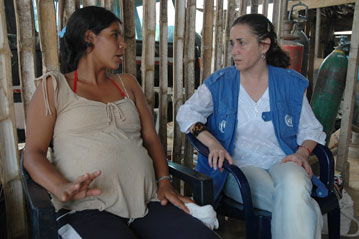- Text size
 |
|  |
|  |
| 
- Français
Colombian asylum seekers face documentation limbo in Venezuela
News Stories, 11 October 2006

APURE STATE, Venezuela, October 11 (UNHCR) – Dozens of little villages and settlements lie along the banks of the Arauca River in the Venezuelan state of Apure, one of the poorest and least developed in the oil-rich country. Among the local population, which subsists on fishing and small-scale farming, are many Colombians who have crossed the river to escape the violence in their country.
Venezuela has long been a land of asylum and it has always been generous in its welcome – Colombians in need of assistance, for example, are allowed to work and have access to the health and education systems. But it can take a long time before asylum seekers get proper documentation – a problem the UN refugee agency is trying to address.
"We are working with the authorities to speed up the process of screening asylum claims and issuing documentation to asylum seekers," said John Fredrikson, UNHCR representative in Venezuela. "It is a huge task, but it is also an extremely important one," he added.
The case of 22-year-old Gustavo highlights the difficulties that Colombians face. He and his family arrived in Apure four years ago after one of the irregular armed groups active in Colombia had tried to forcibly recruit Gustavo. The young man still feels guilty that his family had to leave everything behind because of him.
"The worst thing at the time was that we had to flee the week before Christmas and, since then, every Christmas we remember what happened," he said. "But you have to keep looking forward. It's hard enough sometimes, but if you keep looking back, it becomes impossible to move on."
Gustavo has moved on. Thanks to Venezuela's generous policies, he has been able to take advantage of a free secondary education in Apure. He is a good student, so good that he was selected last year for a scholarship to study medicine in Cuba. It was a proud moment for him and his family. Unfortunately, after months of legal wrangling, Gustavo could not go.
Although Gustavo and his family registered as asylum seekers with the Venezuelan authorities in 2003, his case has still not been decided and he has not been issued with any document to legalise his presence in the country. Without such a document, and despite UNHCR's intervention, he was unable to travel to Cuba.
For 26-year-old Diña, who arrived from Arauca in north-eastern Colombia five months ago, the lack of proper documentation became a serious issue when she was about to give birth, The child was very big and in the wrong position so Diña and her husband travelled to the small town of Guasdualito to check into the local clinic. But troops at a checkpoint on the edge of town would not let her pass because she did not have a Venezuelan document.
Alerted by a Colombian neighbour, the local UNHCR team came to visit Diña the following day. Although still worried about giving birth on her own, it was concern over her eight-year-old boy that brought her to tears on that day.
"We had to leave him behind when we fled Colombia because we didn't know what we would find here," she says. "He is with my husband's parents and I know that for now that is the best place for him. But it is hard, so hard. I have been thinking about him all the time since we've been here."
Diña agreed to travel with the UNHCR team the following morning, when her husband could accompany her. But when the team came back, Diña had already given birth to a healthy girl she called Patrizia – a happy chapter in an otherwise bleak story for the young woman.
By Marie-Hélène Verney in Apure State, Venezuela







































